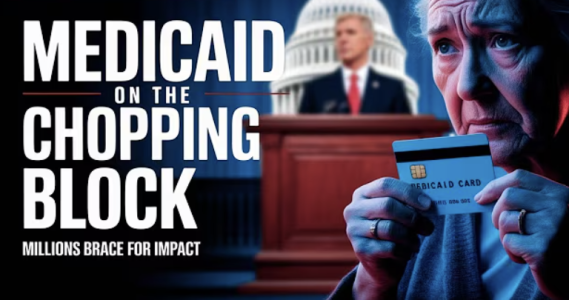Millions may lose Medicaid—see which states are most affected
- Replies 0
A critical shift is unfolding in the background of America’s healthcare system.
Millions may soon be impacted—and many don’t even realize it.
If you or someone you love relies on Medicaid, now is the time to pay close attention.
A GOP-led budget resolution recently advanced through the House.
It opens the door for sweeping Medicaid changes, especially around eligibility and federal funding.
While it doesn’t immediately cut the program, it directs major spending reductions that would almost certainly affect it.
Experts say the consequences could be wide-reaching—and fast-moving.

The Center on Budget and Policy Priorities (CBPP) released a sobering analysis.
According to their data, 36 million adults—roughly 44% of all Medicaid enrollees—could be at risk of losing coverage.
This is largely due to expanded federal work requirements now under serious consideration.
A separate report from the Robert Wood Johnson Foundation found similar concerns.
Their analysis estimates that every state that expanded Medicaid during the COVID-19 pandemic could lose at least 10,000 enrollees if those requirements take effect.
In large states like California and New York, that number could stretch into the hundreds of thousands.
Also read: Work or lose coverage? Medicaid plan sparks concern. How are you affected?
This is due not only to population size but also to the scale of previous Medicaid expansion under the Affordable Care Act.
Other at-risk states include Arizona, Michigan, Illinois, and New Jersey—where six-figure coverage losses are possible.
Many of these states could be forced to scale back healthcare access quickly and dramatically.
In Georgia, the "Pathways" Medicaid program is already operating under work requirement rules.
It has spent more than $40 million—mostly on administrative and consulting fees, not direct care.
Twelve other states have “trigger laws” tied to federal Medicaid funding levels.
If federal contributions fall below 90%, those states are required to roll back their Medicaid expansions.
According to the Center for American Progress, more than 3.6 million people would lost coverage under these rollbacks.
Because Medicaid and Medicare make up a large share of that spending, both programs are considered highly vulnerable.
Lawmakers expect the House Energy and Commerce Committee to begin Medicaid markups in early May.
GOP members have already signaled they will push to include work requirements in their proposed reconciliation bill.
Also read: Trump’s recent Medicaid comments leave seniors with questions
Chris Fong, CEO of Smile Insurance, told Newsweek, “It is likely that we will see the work requirement for Medicaid individuals. Our hope is that there will be some exceptions due to disability levels.”
But there’s no official assurance that such exceptions will be honored.
Kevin Thompson, CEO of 9i Capital Group, said, “Unfortunately, [these changes] may come at the expense of programs like Medicaid… Poorer states that rely heavily on federal assistance may bear the greatest burden.”
And from a policy perspective, Alex Beene of the University of Tennessee noted, “Many Medicaid recipients already work… the more paperwork and procedures you add to the process for qualifying for benefits, the fewer who receive them because they are either unaware or unable to complete those additional tasks.”
CBPP analysts Gideon Lukens and Elizabeth Zhang made their stance clear. “Work requirements have no upside,” they wrote in a February report.
“They strip health coverage from people with low incomes—most of whom are already meeting or exempt from the requirements—leading to gaps in care that damage their health and financial security.”
These changes could also destabilize hospitals, especially those serving rural communities.
More people would face medical debt and delayed diagnoses—leading to worse outcomes long-term.
Also read: The truth about Medicaid cuts and the misinformation spreading online

Is your state one of the hardest hit? Have you or someone close to you faced changes in Medicaid coverage? Join the conversation in the comments—your experience could help others stay informed and prepared.
Millions may soon be impacted—and many don’t even realize it.
If you or someone you love relies on Medicaid, now is the time to pay close attention.
A GOP-led budget resolution recently advanced through the House.
It opens the door for sweeping Medicaid changes, especially around eligibility and federal funding.
While it doesn’t immediately cut the program, it directs major spending reductions that would almost certainly affect it.
Experts say the consequences could be wide-reaching—and fast-moving.

A GOP-led budget resolution recently advanced through the House. Image source: US Daily Rundown / YouTube
The Center on Budget and Policy Priorities (CBPP) released a sobering analysis.
According to their data, 36 million adults—roughly 44% of all Medicaid enrollees—could be at risk of losing coverage.
This is largely due to expanded federal work requirements now under serious consideration.
A separate report from the Robert Wood Johnson Foundation found similar concerns.
Their analysis estimates that every state that expanded Medicaid during the COVID-19 pandemic could lose at least 10,000 enrollees if those requirements take effect.
In large states like California and New York, that number could stretch into the hundreds of thousands.
Also read: Work or lose coverage? Medicaid plan sparks concern. How are you affected?
The states most vulnerable to major Medicaid losses include California, New York, Pennsylvania, and North Carolina.This is due not only to population size but also to the scale of previous Medicaid expansion under the Affordable Care Act.
Other at-risk states include Arizona, Michigan, Illinois, and New Jersey—where six-figure coverage losses are possible.
Many of these states could be forced to scale back healthcare access quickly and dramatically.
In Georgia, the "Pathways" Medicaid program is already operating under work requirement rules.
It has spent more than $40 million—mostly on administrative and consulting fees, not direct care.
Twelve other states have “trigger laws” tied to federal Medicaid funding levels.
If federal contributions fall below 90%, those states are required to roll back their Medicaid expansions.
According to the Center for American Progress, more than 3.6 million people would lost coverage under these rollbacks.
While the GOP budget doesn’t mandate cuts, it calls for $880 billion in spending reductions over the next 10 years.Because Medicaid and Medicare make up a large share of that spending, both programs are considered highly vulnerable.
Lawmakers expect the House Energy and Commerce Committee to begin Medicaid markups in early May.
GOP members have already signaled they will push to include work requirements in their proposed reconciliation bill.
Also read: Trump’s recent Medicaid comments leave seniors with questions
Chris Fong, CEO of Smile Insurance, told Newsweek, “It is likely that we will see the work requirement for Medicaid individuals. Our hope is that there will be some exceptions due to disability levels.”
But there’s no official assurance that such exceptions will be honored.
Kevin Thompson, CEO of 9i Capital Group, said, “Unfortunately, [these changes] may come at the expense of programs like Medicaid… Poorer states that rely heavily on federal assistance may bear the greatest burden.”
And from a policy perspective, Alex Beene of the University of Tennessee noted, “Many Medicaid recipients already work… the more paperwork and procedures you add to the process for qualifying for benefits, the fewer who receive them because they are either unaware or unable to complete those additional tasks.”
CBPP analysts Gideon Lukens and Elizabeth Zhang made their stance clear. “Work requirements have no upside,” they wrote in a February report.
“They strip health coverage from people with low incomes—most of whom are already meeting or exempt from the requirements—leading to gaps in care that damage their health and financial security.”
These changes could also destabilize hospitals, especially those serving rural communities.
More people would face medical debt and delayed diagnoses—leading to worse outcomes long-term.
Also read: The truth about Medicaid cuts and the misinformation spreading online
Key Takeaways
- The GOP-led House's budget resolution may bring sweeping changes to Medicaid, potentially affecting eligibility and funding.
- An analysis suggests 36 million adults could lose Medicaid coverage if expanded work requirements are implemented, with the greatest impact in states that expanded Medicaid under the ACA.
- The House Energy and Commerce Committee is set to begin marking up Medicaid-related legislation that may include work requirements.
- Experts warn that Medicaid work requirements could increase medical debt, delay diagnoses, and destabilize hospitals, especially in rural areas.






